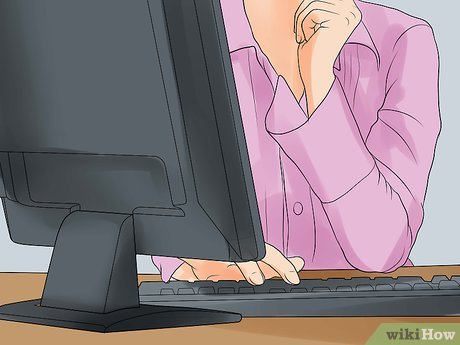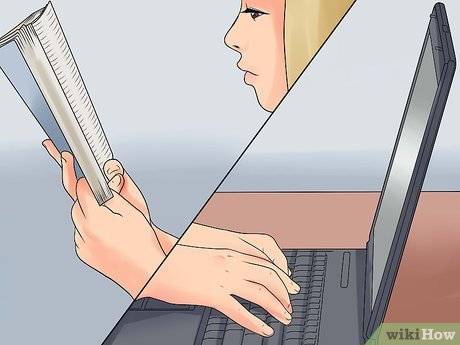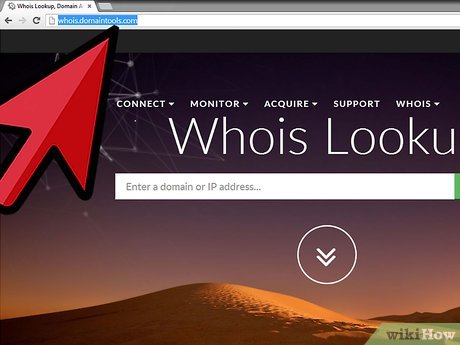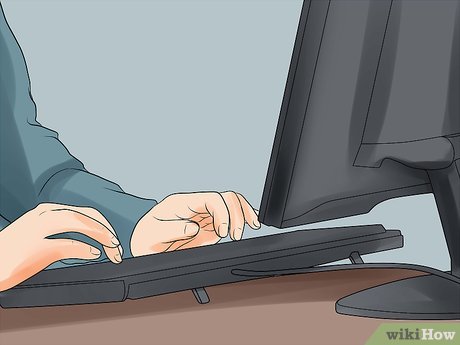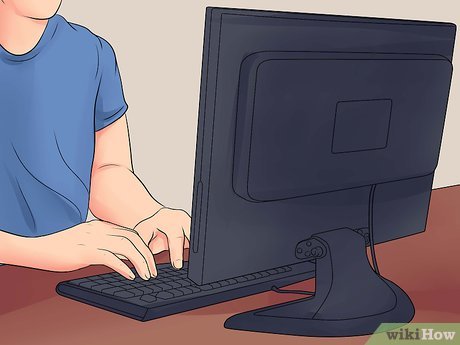How to Evaluate the Credibility of a Source
Source Evaluation Help
 Source Evaluation Cheat Sheet
Source Evaluation Cheat SheetMethod 1 of 2:
Evaluating Sources for Academic Projects
-
 Understand academic standards. Scholarly writers are held to a higher standard of rigor than casual writers and even some branches of journalism. As such, you must hold your sources to a higher standard as well.
Understand academic standards. Scholarly writers are held to a higher standard of rigor than casual writers and even some branches of journalism. As such, you must hold your sources to a higher standard as well.- Citing information from an unreliable source makes academic audiences wary of your entire argument because it is based on information held to a lower level of integrity.
- Academics have a long memory; too many transgressions into the land of unreliable sources, and you'll be a marked writer with a marred reputation.
-
 Consider the author's scholarly reputation.[1] Within each field, there are a handful of scholarly thinkers considered the giants of the discipline. For example in literary theory, Jacques Lacan, Jacques Derrida, and Michel Foucalt are three towering figures whose work provides the bedrock of the discipline; citing them would go a long way toward establishing your credibility as a scholar within the field.
Consider the author's scholarly reputation.[1] Within each field, there are a handful of scholarly thinkers considered the giants of the discipline. For example in literary theory, Jacques Lacan, Jacques Derrida, and Michel Foucalt are three towering figures whose work provides the bedrock of the discipline; citing them would go a long way toward establishing your credibility as a scholar within the field.- This is not to say that less-established scholars' work is not credible. Sometimes, citing a scholar who goes against the tide of established thinking provides you with ammunition for a compelling devil's advocate argument.
- In academia, these types of arguments are sometimes more valued than those based on the writings of famous thinkers because they suggest you have the ability to question accepted thinking and push the boundaries of the discipline.
- Be aware of any credibility scandals that may have befallen even well-established academics. For example, critical theorist Slavoj Žižek's reputation and credibility has been significantly damaged after a 2014 accusation of plagiarism.[2]
-
 Focus on scholarly, peer-reviewed sources. These sources should be your first avenue of research when undertaking an academic project. They have the highest possible level of credibility, and you can always feel safe using them. There are two elements to unpack for this designation: 'scholarly' and 'peer-reviewed.'
Focus on scholarly, peer-reviewed sources. These sources should be your first avenue of research when undertaking an academic project. They have the highest possible level of credibility, and you can always feel safe using them. There are two elements to unpack for this designation: 'scholarly' and 'peer-reviewed.'- Scholarly sources are written by experts in a particular discipline for other experts in their field. They are written to inform, not entertain, and assume a high level of previous knowledge because they are written specifically to people who have a vested professional interest in technical information relevant to their specialization.
- Peer-reviewed articles are not only written by experts, but are also read and evaluated by a panel of peers — other experts in the field. This panel of experts determines whether or not the sources used in the article were credible, whether the methodologies used in studies are scientifically sound, and render a professional opinion as to whether or not an article meets the academic standard of integrity. Only then will an article be published in a scholarly, peer-reviewed journal.
- Almost all peer-reviewed journals require a subscription fee. However, if you have an active .edu email account from a university where you either attend or work, you can make use of the library's subscriptions to databases to access these journals.
- Using the library website's database search engine, use the advanced search to restrict your search results to 'peer-reviewed' sources.
-
 Use discretion with all websites. If you are using any online source other than a scholarly university database, you should exercise caution because anyone can publish their thoughts on the internet, regardless of the merit of those thoughts.
Use discretion with all websites. If you are using any online source other than a scholarly university database, you should exercise caution because anyone can publish their thoughts on the internet, regardless of the merit of those thoughts.- As a general rule, all .gov websites are credible because they have the weight of governmental institutions behind them.
- Websites that end in .com and .org are sometimes credible, but sometimes not. In these cases, you need to look at the institution or organization that is producing the information. A private individual does not have the credibility needed for academic work; however, a large, established organization like the American Medical Association or the Centers for Disease Control and Prevention do.
- There are large, famous organizations that are still known to have biases. For example, People for the Ethical Treatment of Animals will provide only that information which supports their cause, whereas the U.S. Fish and Wildlife Services might provide the same family of information without agenda bias.
- Websites that end in .edu also fall into the category of 'sometimes credible.' Individual faculty often provide course websites that include information pertinent to classes they teach. These sites may include lecture materials and interpretation of sources. While faculty at a university are reputable, this information does not go through the 'peer-review' process discussed earlier. As such, you should be more cautious with it.
- If at all possible, look for that same information from a peer-reviewed source, rather than a professor's personal .edu source.
-
 Avoid self-published material at all costs. If an author is unable to convince a publisher to house their ideas, it's likely because their ideas carry little weight. Never cite an author who self-published their work.
Avoid self-published material at all costs. If an author is unable to convince a publisher to house their ideas, it's likely because their ideas carry little weight. Never cite an author who self-published their work. -
 Distinguish between scholarly and non-scholarly books. If an author has had their manuscript accepted for publication, that means that someone has deemed their ideas worthy of discussion. However, there is a significant and important difference between books published for scholarly and non-scholarly purposes.
Distinguish between scholarly and non-scholarly books. If an author has had their manuscript accepted for publication, that means that someone has deemed their ideas worthy of discussion. However, there is a significant and important difference between books published for scholarly and non-scholarly purposes.- Scholarly books are written with the sole purpose of informing; they offer new ideas, criticize old ones, and present new data or theories relevant to an audience of academic scholars. Non-scholarly books might deal with scholarly subject matter — sociology, for example, or politics. However, they are written to entertain a lay audience, not to inform a scholarly audience.
- Scholarly books are often published by university presses (Amherst College Press) and professional associations (American Historical Association), whereas non-scholarly articles are published by commercial publishers (Houghton Mifflin).[3]
- Scholarly books will provide an extensive list of references to bolster their academic credibility, whereas non-scholarly books often make claims without any credible referential support.
-
 Avoid using textbooks except for background information. Textbooks are wonderful teaching aids; they condense technical information into easily understandable language for students who are learning that material for the first time. However, they include only that information that is accepted by consensus within a field. As such, you should not rely on such obvious (to academics in the field) information to create the main thrust of your academic argument.
Avoid using textbooks except for background information. Textbooks are wonderful teaching aids; they condense technical information into easily understandable language for students who are learning that material for the first time. However, they include only that information that is accepted by consensus within a field. As such, you should not rely on such obvious (to academics in the field) information to create the main thrust of your academic argument.- Use information from a textbook only for the background information necessary to build the foundation for your more innovative argument.
-
 Consider the timeliness of the source. Scholarship is a continually evolving body of knowledge, and information that is once groundbreaking may be proven incorrect or outdated within a few years or even months. Always check the date of publication for a source before making a decision about whether or not it is reliable information for your project.
Consider the timeliness of the source. Scholarship is a continually evolving body of knowledge, and information that is once groundbreaking may be proven incorrect or outdated within a few years or even months. Always check the date of publication for a source before making a decision about whether or not it is reliable information for your project.- For example, as recently as the 1960s, most scholarly linguists believed African American Vernacular English to be a deficient, broken form of standard American English reflective of African Americans' lack of cognitive abilities. By the 1980s and 90s, the majority of linguists had come to embrace African American Vernacular English as a distinct dialectical variation of American English with its own patterned grammatical structures and diction.[4] The entire line of thinking reversed itself within a couple decades.
-
 Use unacceptable sources and methods in an acceptable way. So far, we have discussed many types of sources that are unacceptable for scholarly writing: many websites, non scholarly books, etc. However, there are ways to use those types of sources to your benefit without citing them.
Use unacceptable sources and methods in an acceptable way. So far, we have discussed many types of sources that are unacceptable for scholarly writing: many websites, non scholarly books, etc. However, there are ways to use those types of sources to your benefit without citing them.- Students are always told, 'Never use Wikipedia.' That's true — you should never cite Wikipedia for multiple reasons: it's written anonymously, so you can't know the credibility of the author, and it's continually updated, so it's not a stable source.
- However, if you find information that you find useful, that information may be cited in a more reputable footnote. If the cited source meets the other standards for credibility, read that source and cite it. Use Wikipedia as a starting point that points you toward better sources.
- Do the same for any other websites that don't meet the high standard for academic integrity.
- If you cannot find that information corroborated in scholarly sources, that's a red flag that the information is not trustworthy, and you should not include it in your argument.
-
 Seek a second opinion. If you are belong to a college community in some way — as student, faculty, staff, or alumnus — check with the English department to see if you have access to a university writing studio. The staff at the writing studio will be able to provide you with a professional opinion on the credibility of a given source. If you are a student, show the source to your professor and ask for their advice in evaluating it.
Seek a second opinion. If you are belong to a college community in some way — as student, faculty, staff, or alumnus — check with the English department to see if you have access to a university writing studio. The staff at the writing studio will be able to provide you with a professional opinion on the credibility of a given source. If you are a student, show the source to your professor and ask for their advice in evaluating it.- Always seek your second opinion ahead of the deadline for your project. If one or more of your sources proves problematic, you will find yourself deleting sections of your paper and scrambling for new sources at the last second.
Method 2 of 2:
Evaluating Sources for Everyday Life
-
 Evaluate the professionalism of production. Generally, the more time and money that is invested into the creation and publishing of the material, the more likely you are to find reliable information. A poorly designed website or pamphlet, or a site that is covered in unsightly advertisements and pop-ups, is not likely to provide information from an individual or organization invested in preserving their reputation or image.
Evaluate the professionalism of production. Generally, the more time and money that is invested into the creation and publishing of the material, the more likely you are to find reliable information. A poorly designed website or pamphlet, or a site that is covered in unsightly advertisements and pop-ups, is not likely to provide information from an individual or organization invested in preserving their reputation or image.- Look for high-end, professional finishes to websites and print publications.
- Note that this does not mean that all information found in well-packaged sources is credible. Templates for well-designed websites are inexpensive and easily available.
-
 Research the author. A source is more credible if written by someone with a degree or other credentials in the subject of interest. If no author or organization is named, the source should not be considered highly credible. However, if the author is presenting original work, evaluate the merit of the ideas, not the credentials. Credentials have never guaranteed innovation and the history of science tells us that the big advances in sciences tend to come from outsiders, not the establishment. Some questions that you should ask about the author are:
Research the author. A source is more credible if written by someone with a degree or other credentials in the subject of interest. If no author or organization is named, the source should not be considered highly credible. However, if the author is presenting original work, evaluate the merit of the ideas, not the credentials. Credentials have never guaranteed innovation and the history of science tells us that the big advances in sciences tend to come from outsiders, not the establishment. Some questions that you should ask about the author are:- Where does the author work?
- If the author is affiliated with a reputable institution or organization, what are its values and goals? Do they benefit financially by promoting a particular view?
- What is his or her educational background?
- What other works has the author published?
- What experience does the author have? Is s/he an innovator, or a follower and promoter of the status quo?
- Has this author been cited as a source by other scholars or experts in the field?
- In the case of an anonymous author, you can check who published the website with http://whois.domaintools.com. It will tell you who registered the domain name and when, how many other domains they have, an email address to reach the person or organization as well as the mailing address.
-
 Check the date. Find out when the source was published or revised. In some subject areas, such as the sciences, having current sources is essential; but in other fields, like the humanities, including older material is critical. It's also possible that you're looking at an older version of the source, and an updated one has since been published. Check with a scholarly database for academic sources (or an online bookstore for popular sources) to see if a more recent version is available. If so, not only should you find it, but you can also feel more confident about the source — the more printings or editions, the more reliable the information.
Check the date. Find out when the source was published or revised. In some subject areas, such as the sciences, having current sources is essential; but in other fields, like the humanities, including older material is critical. It's also possible that you're looking at an older version of the source, and an updated one has since been published. Check with a scholarly database for academic sources (or an online bookstore for popular sources) to see if a more recent version is available. If so, not only should you find it, but you can also feel more confident about the source — the more printings or editions, the more reliable the information. -
 Investigate the publisher. The institution housing the information can often tell you a great deal about how credible that information is. For example, you should feel more comfortable trusting information found in The New York Times or The Washington Post — two newspapers with proven track records of journalistic integrity and public retraction of errors — than that found in a source like Infowars, which has a wide readership, but often publishes misleading or blatantly incorrect information.[5]
Investigate the publisher. The institution housing the information can often tell you a great deal about how credible that information is. For example, you should feel more comfortable trusting information found in The New York Times or The Washington Post — two newspapers with proven track records of journalistic integrity and public retraction of errors — than that found in a source like Infowars, which has a wide readership, but often publishes misleading or blatantly incorrect information.[5] -
 Determine the intended audience. Scan the document in question for tone, depth, and breadth before absorbing the information in it. Are those three elements appropriate for your project?[2] Using a source that is too specialized and technical for your needs may lead you to misinterpret the information given, which is just as hurtful to your own credibility as using an unreliable source.
Determine the intended audience. Scan the document in question for tone, depth, and breadth before absorbing the information in it. Are those three elements appropriate for your project?[2] Using a source that is too specialized and technical for your needs may lead you to misinterpret the information given, which is just as hurtful to your own credibility as using an unreliable source. -
 Check the reviews. You should make use of resources like Book Review Index, Book Review Digest, and Periodical Abstracts to determine how and why others have criticized the source. If there is significant controversy surrounding the validity of the source, you may wish to avoid using it, or examine it further with a skeptical eye.
Check the reviews. You should make use of resources like Book Review Index, Book Review Digest, and Periodical Abstracts to determine how and why others have criticized the source. If there is significant controversy surrounding the validity of the source, you may wish to avoid using it, or examine it further with a skeptical eye. -
 Evaluate the source's sources. Citing other reliable sources is a sign of credibility. It is, however, sometimes necessary to verify that the other sources also show a pattern of credibility and are used in context.
Evaluate the source's sources. Citing other reliable sources is a sign of credibility. It is, however, sometimes necessary to verify that the other sources also show a pattern of credibility and are used in context. -
 Identify bias. If the source's author is known to be emotionally or financially connected with the subject, be aware that the source may not fairly represent all views. Sometimes research is necessary to determine relationships that indicate the possibility of bias; look up the author and the publishing institution to see if they have been accused of biased work in the past.
Identify bias. If the source's author is known to be emotionally or financially connected with the subject, be aware that the source may not fairly represent all views. Sometimes research is necessary to determine relationships that indicate the possibility of bias; look up the author and the publishing institution to see if they have been accused of biased work in the past.- Be conscious of wording that indicates judgment. Conclusions that describe something as "bad or good" or "right or wrong" should be examined critically. It is more appropriate to compare something to an objective standard than to label it with words that represent abstract concepts — for example, "...these and other illegal acts..." is preferable to "...these and other despicable acts..."
- The former describes the acts in terms of the law (an objective source) whereas the second example judges the actions according to the author's own belief of what is a despicable act.
-
 Evaluate consistency. Sources that apply different standards to those who agree and disagree with them are suspect. If your source praises one politician for "changing to meet the needs of his constituency" but criticizes an opposing politician for "changing his position with opinion polls," then it is likely that the source is biased.
Evaluate consistency. Sources that apply different standards to those who agree and disagree with them are suspect. If your source praises one politician for "changing to meet the needs of his constituency" but criticizes an opposing politician for "changing his position with opinion polls," then it is likely that the source is biased. -
 Investigate the financial or funding sources for sponsored research. Determine the sources of funding for the work to get an idea of the potential influences on it. Various sources of funding can sway the information presented or the way a study is conducted in order to align with their own agendas.
Investigate the financial or funding sources for sponsored research. Determine the sources of funding for the work to get an idea of the potential influences on it. Various sources of funding can sway the information presented or the way a study is conducted in order to align with their own agendas.- For example, the BMJ (formerly the British Medical Journal) banned all tobacco research funded by tobacco companies in 2013 because they determined that the special interests of the research funders would lead to biased, unreliable conclusions.[6]
Share by
Lesley Montoya
Update 24 March 2020



